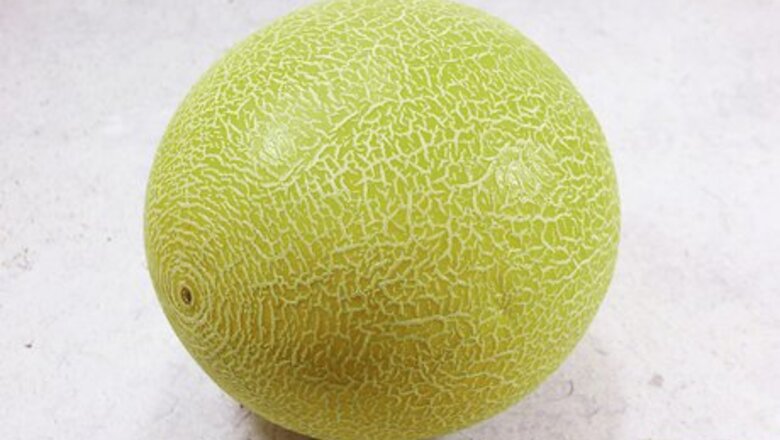
views
Cutting the Cantaloupe
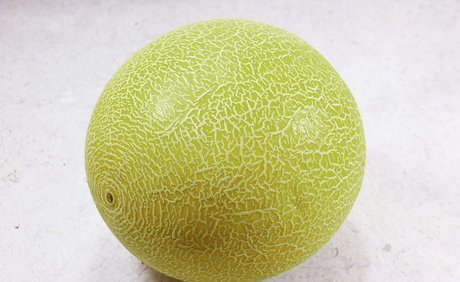
Check the cantaloupe to make sure it is ripe. Smell the exterior of the cantaloupe to check its ripeness. The rind will have a sweet and fragrant smell. Examine the rind; it should have a slightly wrinkled texture. To further ripen the cantaloupe, leave it on the counter at room temperature for another day or so before cutting it. If the cantaloupe has a foul odor or large, black soft spots, then the melon is rotten and you should discard it.
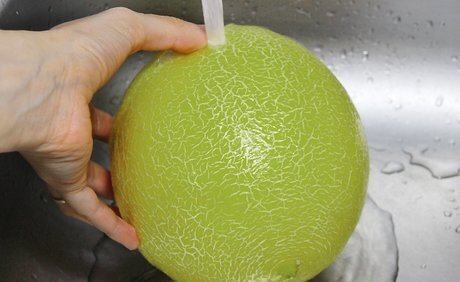
Rinse the cantaloupe under cool water and dry it before cutting. Wash the cantaloupe under cool water, and use your fingers or a produce scrub brush to remove any grime from the wrinkled skin. The exterior of a cantaloupe can be riddled with dirt and harmful bacteria. Then, pat the cantaloupe dry to make it easier to handle when you go to cut it. Avoid freezing overripe cantaloupes as the mushy texture will only deteriorate further when defrosted.
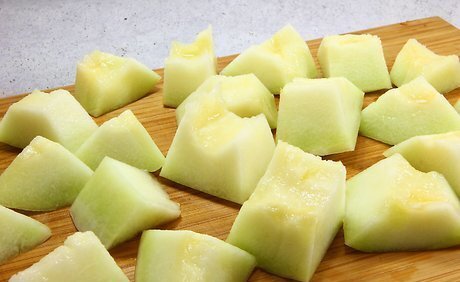
Use a heavy knife to cut the cantaloupe into 1–2 in (2.5–5.1 cm) cubes. Find a method of cutting that you are most comfortable with. There are many different techniques to cut a cantaloupe. Some involve cutting the cantaloupe in half and then chopping off the rind, and others involve cutting the cantaloupe into slices and then carving the rind off the individual pieces. To get started, place the cantaloupe on a cutting board, and brace the side of it with one hand to keep it from rolling. Use a heavy knife to slice about 1 in (2.5 cm) from the top and bottom of the cantaloupe to make a flat surface. Then, place the cantaloupe on one of the flattened ends and carefully cut it in half. Use a metal spoon to scoop out the seeds and pulp from each pitted half of the cantaloupe. Either trim the rind from each half by placing it flat against the cutting board or cut the halves into 1–2 in (2.5–5.1 cm) slices and carefully carve the rind from each slice. Finish by dicing the cantaloupe into 1–2 in (2.5–5.1 cm) cubes.
Storing the Cantaloupe in the Freezer
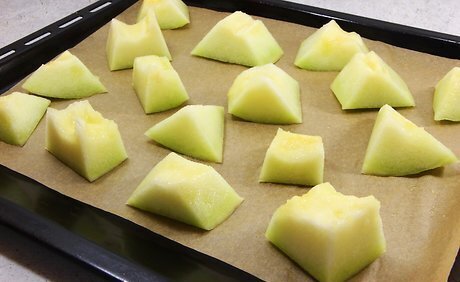
Spread your dices on 1-2 baking sheets lined with parchment paper. Create a single layer of the diced cantaloupe and space the pieces to avoid having them stick to each other. Use 2 baking sheets if needed to properly space all of the melon. If you do not have parchment paper, you can use plastic wrap instead.
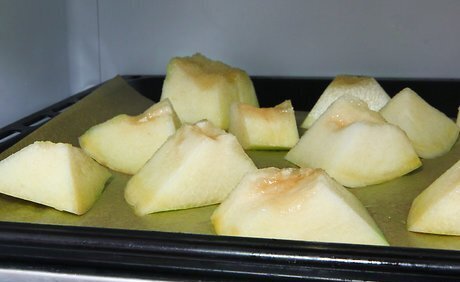
Place the melon in the freezer for 30 minutes to firm. Pre-freeze the melon to solidify the juices around the melon dices. This will keep the melon dices from sticking together when you store them in a container later on. Check the firmness of the melon after 30 minutes by gently squeezing or tapping a few of the larger pieces with your fingers. The melon should be fairly solid and should not be secreting any juice. Leave the melon in the freezer for another 10 minutes if the larger pieces do not seem firm.
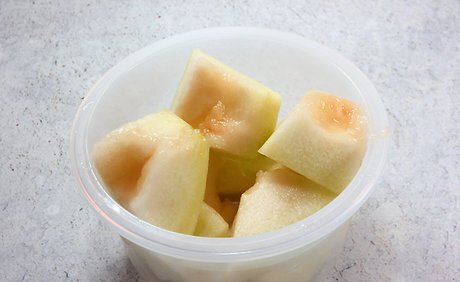
Transfer the firm cantaloupe dices into a sealable container. Choose either a sturdy plastic container or a glass container. Leave about ⁄2 in (1.3 cm) of space between the fruit and the top of the container. This will give the fruit room to expand as it fully freezes. You don't need to wrap the cantaloupe dices before putting them into the container. If you want, place the cantaloupe into a freezer bag if you are storing the cantaloupe without adding any sugar or syrup to further preserve it.
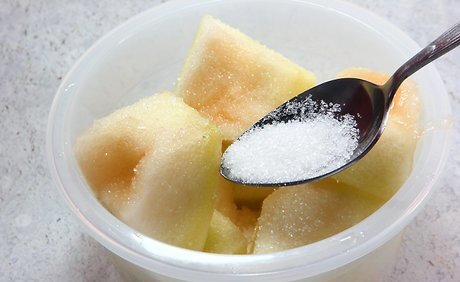
Mix the cantaloupe dices with sugar to further preserve the flavor. If you plan to store the fruit for a long period in the freezer, then consider coating the dices with granulated sugar. The sugar will help the fruit retain its flavor and color while frozen. Use approximately 1 cup (200 g) of granulated sugar for every 1 1/2 cups (200 g) of diced cantaloupe. Toss the sugar into the container with the firm cantaloupe dices to fully coat them.
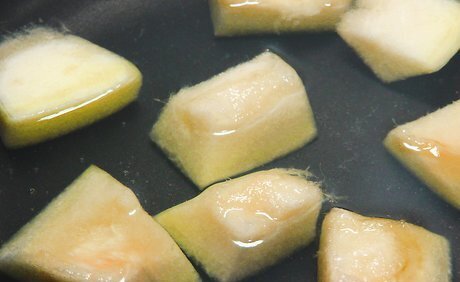
Submerge the dices in a simple syrup to retain the fruit’s texture. If you are planning to use the cantaloupe for a dessert, smoothie, or cocktail, consider submerging the dices with a simple syrup. The syrup will further protect the texture of the fruit and will add to the flavor when defrosted. For a light syrup, combine 9 cups (2,100 mL) of water or fruit juice with 2 1/4 cups (425 g) of granulated sugar in a saucepan. Bring the mixture to a boil and stir it until the sugar is completely dissolved. Transfer the syrup into a heat-resistant container and chill it in the refrigerator for 20 minutes or until it is cooled. Cover the cantaloupe dices with ⁄2 cup (120 mL) or more of the simple syrup. Then, rest a piece of parchment paper against the surface of the syrup to keep the cantaloupe submerged.
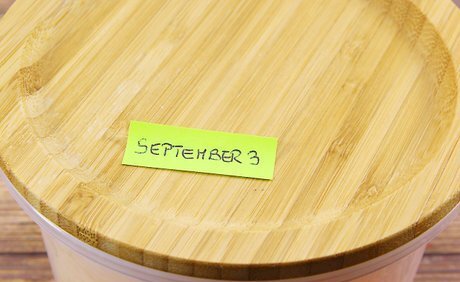
Seal the container and label it with the prepared date before freezing. Make sure the lid is properly sealed to avoid freezer burning your cantaloupe. Then, use a permanent marker and a piece of masking tape to label the container with the date you are freezing it. This will help you determine how long the cantaloupe has been frozen later on.
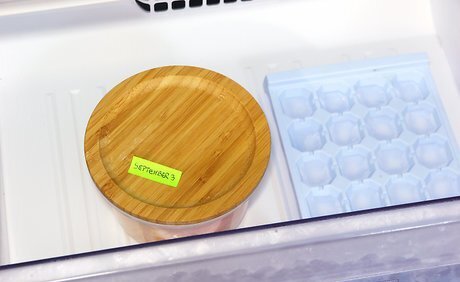
Store the container in the freezer for 10 to 12 months. Keep the cantaloupe frozen for 10 to 12 months. The cantaloupe will last a few months longer beyond the 12 months, but the flavor and texture may begin to deteriorate. If the cantaloupe develops a strange odor or appearance, throw it out immediately.
Defrosting the Cantaloupe
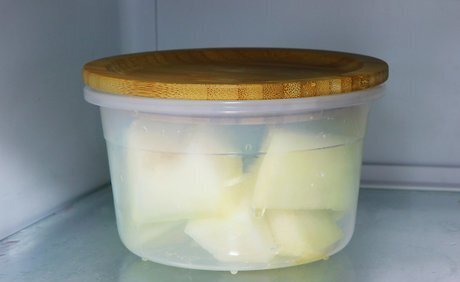
Defrost the cantaloupe in the refrigerator when you are ready to eat it. Leave the container in the refrigerator for 1-2 days to allow it to defrost completely. Check on the cantaloupe periodically to make sure that it is defrosting properly. Place the container on a plate before putting it in the refrigerator. This will catch any of the water running off the container as it defrosts.
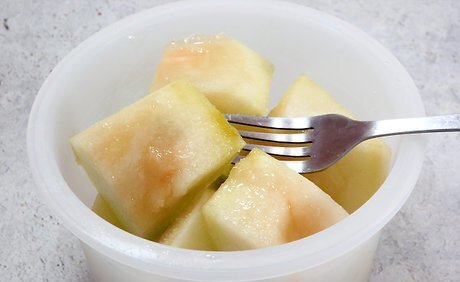
Break up the dices with a spoon as needed to help it defrost quicker. Wedge a spoon between the dices to un-clump any pieces that are stuck together. Leaving the dices clumped will make it take longer to defrost. If you froze your cantaloupe in a simple syrup, stir the mixture with a spoon and rotate the dices after the first day of defrosting. This will aerate the syrup and help the dices defrost quicker.
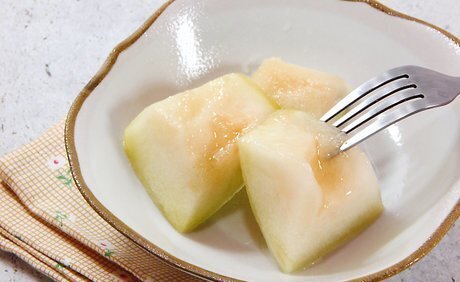
Serve the defrosted cantaloupe as is or add it with other mixed fruit. Enjoy eating juicy, defrosted cantaloupe as a snack, or combine it with other ingredients to make a refreshing smoothie or a fruit salad. Pair it with other fruits like grapes, oranges, apples, peaches, and any other fruit you can think of. This works especially well with cantaloupe that was preserved in a simple syrup. Store the defrosted cantaloupe for up to a week in the refrigerator. Do not refreeze the cantaloupe once it has been defrosted, as this might promote bacteria to grow on the fruit.














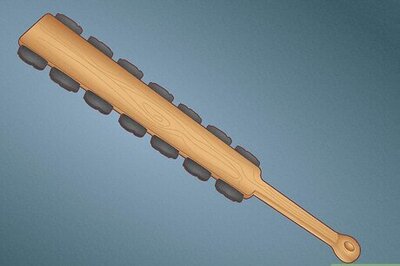


Comments
0 comment